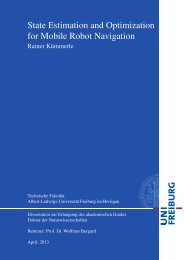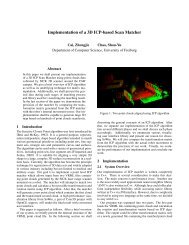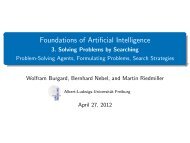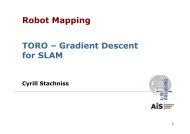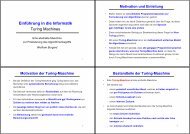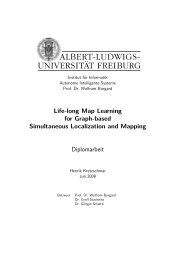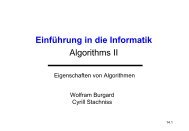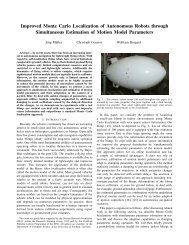13. Acting under Uncertainty Maximizing Expected Utility
13. Acting under Uncertainty Maximizing Expected Utility
13. Acting under Uncertainty Maximizing Expected Utility
You also want an ePaper? Increase the reach of your titles
YUMPU automatically turns print PDFs into web optimized ePapers that Google loves.
The Axioms of <strong>Utility</strong> Theory (1)The Axioms of <strong>Utility</strong> Theory (2)Justification of the MEU principle, i.e., maximization of the average utility.Scenario = Lottery LPossible outcomes = possible prizesThe outcome is determined by chanceL = [p 1 , C 1 ; p 2 , C 2 ; . . . ; p n , C n ]Example:Lottery L with two outcomes, C 1 and C 2 :L = [p, C 1 ; 1 − p, C 2 ]Preference between lotteries:L 1 ≻ L 2 The agent prefers L 1 over L 2L 1 ∼ L 2 The agent is indifferent between L 1 and L 2L 1 L 2 The agent prefers L 1 or is indifferent between L 1 and L 2Given lotteries A, B, COrderability(A ≻ B) ∨ (B ≻ A) ∨ (A ∼ B)An agent should know what it wants: it must either prefer one of the 2lotteries or be indifferent to both.Transitivity(A ≻ B) ∧ (B ≻ C) ⇒ (A ≻ C)Violating transitivity causes irrational behavior: A ≻ B ≻ C ≻ A. Theagent has A and would pay to exchange it for C. C would do the samefor A.→ The agent loses money this way.(University of Freiburg) Foundations of AI July 18, 2012 5 / 32(University of Freiburg) Foundations of AI July 18, 2012 6 / 32The Axioms of <strong>Utility</strong> Theory (3)The Axioms of <strong>Utility</strong> Theory (4)ContinuityA ≻ B ≻ C ⇒ ∃p[p, A; 1 − p, C] ∼ BIf some lottery B is between A and C in preference, then there is someprobability p for which the agent is indifferent between getting B forsure and the lottery that yields A with probability p and C withprobability 1 − p.SubstitutabilityA ∼ B ⇒ [p, A; 1 − p, C] ∼ [p, B; 1 − p, C]If an agent is indifferent between two lotteries A and B, then the agentis indifferent beteween two more complex lotteries that are the sameexcept that B is substituted for A in one of them.MonotonicityA ≻ B ⇒ (p ≥ q ⇔ [p, A; 1 − p, B] [q, A; 1 − q, B])If an agent prefers the outcome A, then it must also prefer the lotterythat has a higher probability for A.Decomposability[p, A; 1 − p, [q, B; 1 − q, C]] ∼ [p, A; (1 − p)q, B; (1 − p)(1 − q), C]Compound lotteries can be reduced to simpler ones using the laws ofprobability. This has been called the “no fun in gambling”-rule: twoconsecutive gambles can be reduced to a single equivalent lottery.(University of Freiburg) Foundations of AI July 18, 2012 7 / 32(University of Freiburg) Foundations of AI July 18, 2012 8 / 32



